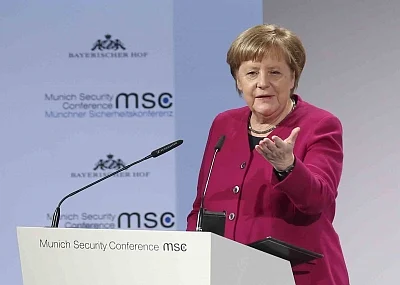Berlin, March 20 (IANS) German Chancellor Angela Merkel has said she will fight for an "orderly Brexit" until "the very last hour".
Merkel said that current events were in a "state of flux", adding that European Union leaders would try to react to whatever the UK proposed, the BBC reported on Tuesday.
The UK is due to leave the EU in 10 days' time, with or without a deal.
Prime Minister Theresa May is writing to European Council President Donald Tusk to ask for an extension. She will meet EU leaders later this week.
May's proposed Brexit deal has already been rejected twice by MPs at Westminster.
The Speaker of the House of Commons, John Bercow, has ruled that Mrs May cannot bring it back for a third vote without "substantial" changes.
Merkel refused to be drawn on whether she would now support an extension. Addressing a conference in Berlin, she said:
"I will fight for an orderly Brexit on March 29 until the very last hour.
"We don't have that much time left... I must say that I'm not in a position to speculate on what I will do on Thursday because it depends on what Theresa May will tell us."
An aide to French President Emmanuel Macron also said any possible request for an extension would not be automatically accepted.
"An extension is not for certain", the aide said.
"First point: is there a plan, a strategy, to justify an extension?"
Also on Tuesday, EU chief negotiator Michel Barnier told reporters that if Mrs May requested an extension, it would be for EU leaders to "assess the reason and the usefulness" for such a request.
"EU leaders will need a concrete plan for the UK in order to be able to make an informed decision and key questions will be: does an extension increase the chances for the ratification of the Withdrawal Agreement?" he said.
Meanwhile, the European Council has adopted a series of contingency measures in the event of the UK leaving the EU without a deal.
The measures are aimed at limiting "the most severe damage caused by a disorderly Brexit", and set out proposals for transport, fisheries, education and social security.
They include ways to minimise disruption to UK students studying in the EU and EU students studying in the UK under the Erasmus+ programme.
--IANS
pgh/
(This story was auto-published from a syndicated feed. No part of the story has been edited by The Quint.)
(At The Quint, we question everything. Play an active role in shaping our journalism by becoming a member today.)
